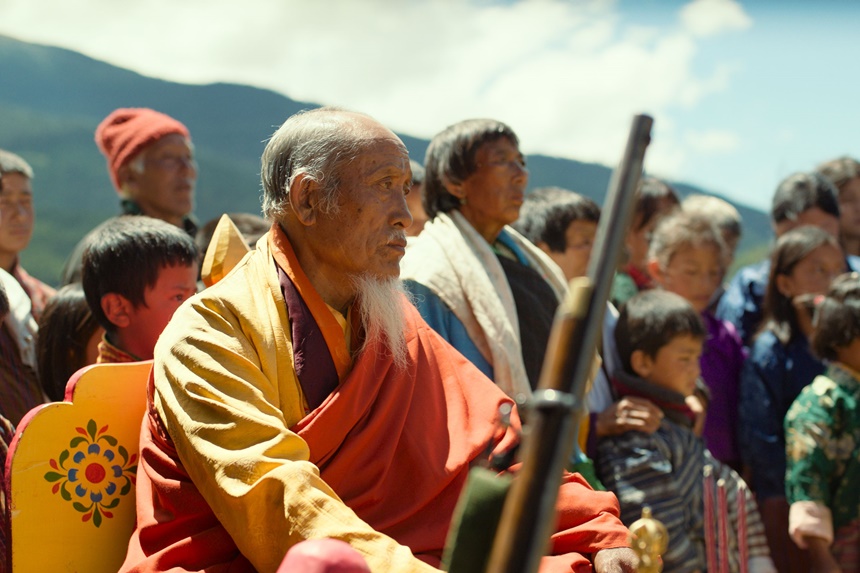The Monk and the Gun
⭐️ ⭐️ ⭐️ ⭐️
Rating: PG-13
Run Time: 1 hour 47 minutes
Stars: Tandin Wangchuk, Harry Einhorn, Tandin Phubz
Writer/Director: Pawo Choyning Dorji
Reviewed at the Toronto International Film Festival
A wistful breeze of goodwill from the foothills of the Himalayas, The Monk and the Gun unfolds like a pink and pretty rhododendron, offering a slyly gentle cautionary tale of democracy’s fragile nature.
The year is 2008 and the country is Bhutan, a tradition-immersed kingdom tucked between China and India. In a surprise move, the nation’s monarch has abdicated his position of complete authority, announcing that the nation will henceforth become a democracy.
If a landlocked country can experience a sea change, this is it. Overnight, a nation of more than 700,000 people, nearly all of them dwelling in remote rural areas, must not only learn the principles of representative government, but also be instructed in the unheard-of practice of voting.
This promise of the new and the persistence of the old find confluence in the mountain village of Ura, where a government supervisor (Pema Zangmo Sherpa) does her best to coax the residents into participating in a mock election. There’s resistance, though: The whole idea of taking up sides in a political contest is foreign to a population that has for centuries learned the only way to survive is through cooperation.
“You hate each other!” declares a government election coach, having randomly split the mystified villagers into red and blue “parties” for the mock election. “Yell at each other!”
High on a nearby mountaintop, a Buddhist lama is listening to the news of democratization on a transistor radio. Summoning a young monk named Tashi (Bhutanese alt-rock star Tandin Wangchuk), the old man orders him to head down to the village and procure for him two guns.
“I must set things right,” he says.
We’re not sure whether to take his words as ominous or not, but Tashi is utterly unquestioning: Off he goes in search of weapons for his master — in a country where guns are more rare than television sets (and where the nation has just launched its first TV channel).
Into this vortex of uncertainty comes an American named Ronald Coleman (Harry Einhorn), also in search of a gun, only in his case a very specific one: An ultra-rare American Civil War rifle that has somehow come into the possession of a local elder (Coleman’s name can only be taken as a nod to the actor Ronald Colman, whose character in 1937’s Lost Horizon similarly found himself learning the ways of a Himalayan culture).
With the help of his local guide/interpreter Benji (Tandin Sonam), Coleman strikes a deal with the old man, only to return with the money and learn the gun is now in the hands of Tashi, who has in the interval procured it in service to his mountaintop master.
Writer/director Pawo Choyning Dorji, born in Bhutan and trained as a filmmaker in the U.S., keeps lots of narrative plates spinning in his multilayered story: Benji’s wife worries that this new thing called politics is tearing her family apart; the villagers, already beginning to take sides in advance of the upcoming real election, seem unsettlingly obsessed with the James Bond film Quantum of Solace, which plays on a loop at a local general store; a pair of government cops are on the trail of Tashi and Coleman, suspecting they are a pair of arms dealers.
And then there are the mysterious intentions of the lama, whose desire for those guns seems to intensify with the approach of a full moon.
Finally, there is the enduring tension between tradition and what the government representatives keep calling “progress.”
“Why are we doing this?” a young mother asks the election organizer.
“So everyone can be happy,” comes the answer.
The mother glances down at her daughter, who is being mistreated at school because of her father’s newfound political stances.
“But,” she protests softly, “we were happy.”
It’s a poignant moment, whether your democracy is just being born or about to celebrate a quarter of a millennium.
Become a Saturday Evening Post member and enjoy unlimited access. Subscribe now




Comments
Your first paragraph says it all, and makes me really want to see it. Thanks, Bill!